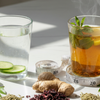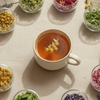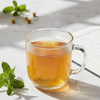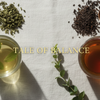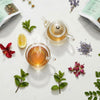The Best Tea for Anxiety and Stress Relief: 10 Calming Blends That Actually Work
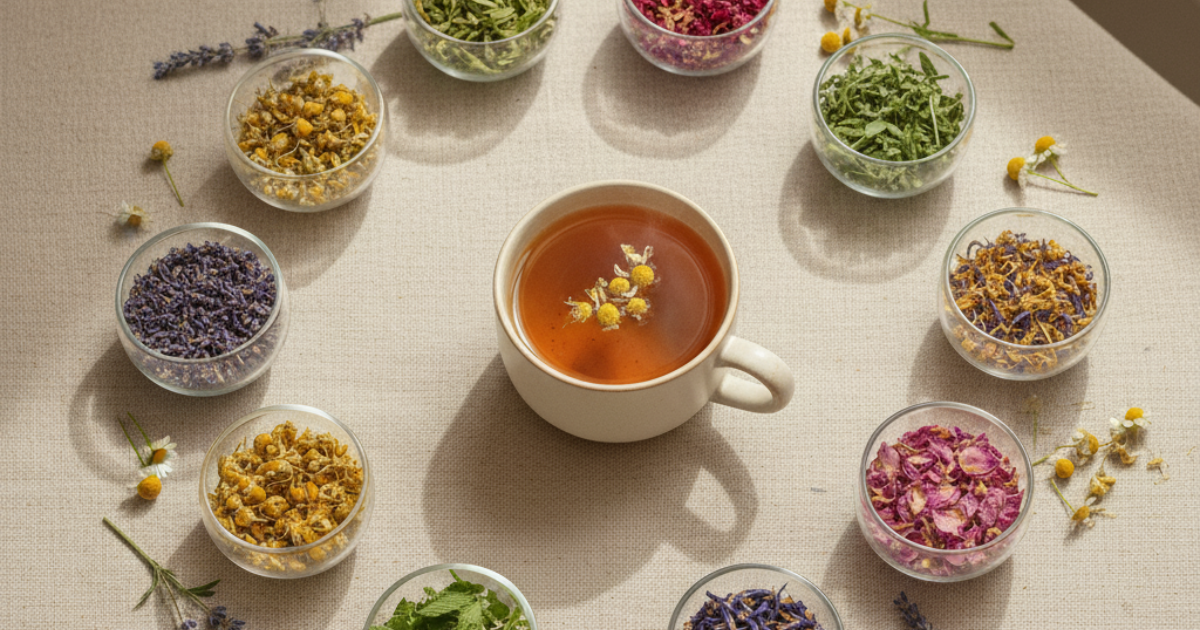
The Silent Epidemic of Modern Anxiety
If you're reading this, chances are you've experienced the racing heart, tight chest, restless thoughts, or overwhelming tension that characterize anxiety and stress. You're far from alone. Recent surveys reveal that over 40% of adults report increased anxiety levels, with stress-related health issues costing billions in healthcare expenses and lost productivity annually.
In our hyperconnected world, where work emails arrive at midnight, social media feeds never sleep, and the pressure to perform seems relentless, chronic stress has become the unwelcome companion of modern life. While pharmaceutical interventions have their place for clinical anxiety disorders, many people seek natural approaches for managing everyday stress and anxiety—methods that work with the body rather than overriding its natural processes.
Enter the ancient wisdom of herbal tea. For thousands of years across diverse cultures, specific plants have been used to calm anxious minds, soothe frayed nerves, and restore emotional equilibrium. Modern science now validates what traditional healers knew intuitively: certain botanical compounds directly influence the nervous system, modulating stress hormones and neurotransmitters in ways that promote genuine relaxation without sedation or dependency.
At Terazi Organics, our name meaning "balance" reflects our understanding that managing anxiety isn't about suppressing emotions—it's about restoring the natural equilibrium that stress disrupts. This comprehensive guide explores the science behind anti-anxiety teas, ranks the ten most effective calming blends based on research evidence, and provides practical strategies for incorporating these gentle allies into your daily wellness routine.
Whether you're dealing with occasional stress, chronic anxiety, or simply seeking more calm in a chaotic world, you'll discover evidence-based herbal solutions that actually work—no prescriptions, no side effects, just nature's pharmacy in a soothing cup.
The Science of Anxiety: Understanding What You're Managing
A. The Physiology of Stress and Anxiety
To appreciate how tea for anxiety works, it's essential to understand what happens in your body during stress responses.
When you perceive a threat—whether a looming deadline, relationship conflict, or financial worry—your hypothalamic-pituitary-adrenal (HPA) axis activates, triggering a cascade of physiological changes:
- Cortisol Release: Your "stress hormone" increases, preparing your body for action
- Sympathetic Nervous System Activation: Your "fight or flight" response engages, increasing heart rate and blood pressure
- Neurotransmitter Shifts: Excitatory neurotransmitters like glutamate increase while calming ones like GABA decrease
- Digestive Disruption: Blood flow diverts from digestion to muscles, causing the "butterflies" feeling
- Sleep Interference: Elevated cortisol and arousal prevent the relaxation necessary for restorative sleep
These responses evolved to help us escape physical danger—and they're lifesaving in genuine emergencies. The problem? Modern stressors are chronic rather than acute, keeping your nervous system in perpetual overdrive without the physical release that would naturally resolve the stress response.
This chronic activation leads to anxiety disorders, insomnia, digestive issues, weakened immunity, and numerous other health problems. The goal of stress relief tea isn't to eliminate your body's stress response—it's to help return your system to baseline more efficiently and prevent chronic activation.
How Anti-Anxiety Tea Actually Works
The most effective calming tea blends work through multiple mechanisms:
GABA Modulation: Many anxiety-relieving herbs contain compounds that enhance gamma-aminobutyric acid (GABA)—your brain's primary inhibitory neurotransmitter. GABA counteracts excitatory signals, creating a sense of calm. Some herbs directly bind to GABA receptors, while others inhibit the enzymes that break down GABA, prolonging its effects.
Cortisol Regulation: Adaptogenic herbs help normalize cortisol levels—reducing them when chronically elevated while supporting healthy stress responses when needed.
Autonomic Nervous System Balance: Certain compounds activate the parasympathetic nervous system—your "rest and digest" mode—counteracting the sympathetic "fight or flight" activation that characterizes anxiety.
Anti-Inflammatory Effects: Emerging research links chronic inflammation to anxiety and depression. Many herbal teas reduce inflammatory markers, potentially addressing anxiety at its roots.
Aromatic Effects: The volatile compounds in herbal tea interact with your olfactory system, sending signals directly to the limbic system—your brain's emotional center—triggering immediate relaxation responses before you even take a sip.
Understanding these mechanisms helps explain why stress relief tea offers genuine benefits rather than placebo effects, and why certain herbs consistently outperform others for anxiety management.
The Top 10 Teas for Anxiety and Stress Relief: Ranked by Science
Chamomile Tea (Matricaria chamomilla)
Scientific Effectiveness Rating: 10/10
Chamomile claims the top position based on the most extensive research portfolio and consistently demonstrated effectiveness for anxiety relief.
How It Works: Chamomile contains apigenin, a flavonoid that binds to benzodiazepine receptors in the brain—the same receptors targeted by anti-anxiety medications like Xanax, but without the side effects or dependency risks. This creates genuine anxiolytic (anti-anxiety) effects through the GABA system.
Scientific Evidence:
- A randomized controlled trial published in the Journal of Clinical Psychopharmacology found that participants with generalized anxiety disorder (GAD) who took chamomile extract showed significantly reduced anxiety symptoms compared to placebo groups
- Research in Phytomedicine demonstrated that chamomile reduced cortisol levels and improved sleep quality in stressed individuals
- A study following participants for 8 weeks found chamomile not only reduced anxiety but also prevented relapse when continued long-term
Practical Application: Steep 1-2 teaspoons of dried chamomile flowers in 8oz of water at 200°F for 5-7 minutes. Drink 1-3 cups daily, with one cup 30-60 minutes before bed for maximum sleep and anxiety benefits.
Best For: General anxiety, stress-related insomnia, digestive upset from nervous tension, worry and rumination.
Lavender Tea (Lavandula angustifolia)
Scientific Effectiveness Rating: 9.5/10
The calming scent of lavender is well-known, but consuming lavender tea offers even more profound anti-anxiety benefits.
How It Works: Lavender contains linalool and linalyl acetate—compounds that modulate GABA, serotonin, and dopamine neurotransmitter systems. These work synergistically to reduce anxiety while promoting emotional balance. The aromatic compounds also provide immediate calming effects through olfactory pathways.
Scientific Evidence:
- A clinical trial in Phytomedicine found lavender oil capsules were as effective as lorazepam (a common anti-anxiety medication) for generalized anxiety disorder without the sedation or dependency risks
- Research published in the International Journal of Psychiatry in Clinical Practice showed lavender significantly reduced anxiety levels in participants within just two weeks
- Studies demonstrate lavender improves sleep quality, reduces restlessness, and helps manage stress-related headaches
Practical Application: Use 1-2 teaspoons of culinary lavender buds per cup, steeping at 200°F for 5 minutes. The flavor is floral and slightly sweet—if too intense, blend with chamomile or mint for a more balanced taste.
Best For: Acute anxiety episodes, nervous tension, stress headaches, irritability, and preparing for anxiety-provoking situations.
Passionflower Tea (Passiflora incarnata)
Scientific Effectiveness Rating: 9/10
This beautiful flowering vine offers powerful anti-anxiety properties backed by compelling research.
How It Works: Passionflower increases GABA levels in the brain by inhibiting the enzyme that breaks it down. It also contains harmala alkaloids that may have MAOI (monoamine oxidase inhibitor) properties, potentially supporting mood regulation.
Scientific Evidence:
- A double-blind study in the Journal of Clinical Pharmacy and Therapeutics found passionflower as effective as oxazepam (a benzodiazepine) for managing anxiety, with fewer side effects
- Research showed passionflower reduced anxiety before surgery as effectively as conventional anti-anxiety medication
- Studies demonstrate it particularly helps anxiety accompanied by restlessness and insomnia
Practical Application: Steep 1 teaspoon of dried passionflower in boiling water for 7-10 minutes. Start with one cup in the evening, as it can cause drowsiness in sensitive individuals.
Best For: Racing thoughts, anxiety-related insomnia, nervous exhaustion, and generalized anxiety with physical restlessness.
Lemon Balm Tea (Melissa officinalis)
Scientific Effectiveness Rating: 8.5/10
This lemony, minty herb from the mint family offers both immediate calming effects and cumulative stress-resilience benefits.
How It Works: Lemon balm increases GABA availability while reducing cortisol levels. It contains rosmarinic acid and other compounds that bind to GABA receptors and inhibit GABA transaminase—the enzyme that breaks down GABA. Additionally, it modulates acetylcholine receptors, potentially supporting cognitive function during stress.
Scientific Evidence:
- Research in Psychosomatic Medicine found that participants taking lemon balm extract experienced significant anxiety reduction and improved calmness within hours
- A study with stressed participants showed lemon balm improved mood, reduced anxiety, and enhanced cognitive performance simultaneously—rare among anxiolytic herbs
- Research indicates lemon balm helps specifically with stress-induced digestive issues
Practical Application: Use 2-3 teaspoons of dried lemon balm per cup, steeping for 5-7 minutes. The pleasant lemon-mint flavor makes it enjoyable to drink throughout the day. Can be consumed 3-4 times daily without drowsiness.
Best For: Daytime anxiety management, stress with digestive upset, nervous agitation, exam or performance anxiety where mental clarity must be maintained.
Valerian Root Tea (Valeriana officinalis)
Scientific Effectiveness Rating: 8/10
While most famous for sleep support, valerian root offers significant anxiety-relieving properties, particularly for stress manifesting as physical tension.
How It Works: Valerian contains valerenic acid, which inhibits the breakdown of GABA in the brain, increasing its calming effects. It also acts on adenosine receptors, contributing to its sedative properties.
Scientific Evidence:
- A meta-analysis of multiple studies found valerian significantly reduced anxiety symptoms, particularly when combined with other calming herbs
- Research shows valerian reduces the physical symptoms of anxiety—muscle tension, trembling, and stress-related headaches
- Studies indicate valerian's effects strengthen with consistent use over 2-4 weeks
Practical Application: Valerian has a strong, earthy aroma that some find unpleasant. Steep 1 teaspoon of dried valerian root in boiling water for 10 minutes. Best consumed in the evening due to sedative properties. Many people prefer valerian in blends with more pleasant-tasting herbs.
Important Note: Valerian may interact with sedative medications and alcohol. Consult healthcare providers if taking other medications.
Best For: Anxiety with significant physical tension, stress-related insomnia, muscle tightness from chronic stress.
Holy Basil / Tulsi Tea (Ocimum sanctum)
Scientific Effectiveness Rating: 8/10
This sacred herb from Ayurvedic tradition functions as an adaptogen, helping your body adapt to stress while providing direct anxiety relief.
How It Works: Holy basil modulates cortisol levels, supports healthy stress hormone rhythms, and influences neurotransmitter systems. As an adaptogen, it helps normalize physiological processes disrupted by chronic stress rather than simply sedating.
Scientific Evidence:
- Research published in Evidence-Based Complementary and Alternative Medicine found holy basil significantly reduced stress, anxiety, and depression symptoms
- A study following participants for 6 weeks showed progressive improvements in stress symptoms and stress-related sexual dysfunction
- Research demonstrates holy basil protects against stress-induced cognitive impairment
Practical Application: Steep 1-2 teaspoons in boiling water for 5-7 minutes. Holy basil has a spicy, slightly minty flavor. Unlike sedating herbs, tulsi can be consumed throughout the day without drowsiness.
Best For: Chronic stress, burnout, stress-related fatigue, situations requiring stress management without sedation, supporting healthy cortisol rhythms.
Ashwagandha Tea (Withania somnifera)
Scientific Effectiveness Rating: 7.5/10
Another powerful adaptogen, ashwagandha offers particularly strong benefits for anxiety accompanied by fatigue—the "tired but wired" state many experience.
How It Works: Ashwagandha modulates the HPA axis, reducing excessive cortisol while supporting healthy stress responses. It also influences GABA receptors and supports neurotransmitter balance. Research shows it helps rebuild stress resilience over time.
Scientific Evidence:
- A randomized controlled trial found participants taking ashwagandha extract experienced 44% reduction in perceived stress and significant anxiety reduction
- Research in the Indian Journal of Psychological Medicine demonstrated ashwagandha reduced anxiety and improved overall wellbeing
- Studies show ashwagandha specifically helps the exhaustion and irritability that accompany chronic stress
Practical Application: Simmer 1 teaspoon of ashwagandha root powder in water for 10-15 minutes, or steep for longer if using dried root pieces. The flavor is earthy and slightly bitter—often improved by adding cinnamon, cardamom, or milk. Effects build over 2-4 weeks of consistent use.
Best For: Chronic stress with fatigue, burnout, stress-related insomnia, rebuilding stress resilience long-term.
Blue Lotus Tea (Nymphaea caerulea)
Scientific Effectiveness Rating: 7/10
This sacred flower from ancient Egypt offers unique relaxation properties with mild euphoric qualities—creating a sense of ease and contentment.
How It Works: Blue lotus contains aporphine and nuciferine—alkaloids that interact with dopamine receptors, potentially creating mild euphoria and relaxation. It may also have mild sedative properties through serotonin pathways.
Scientific Evidence: While traditional use is extensive, modern research is more limited than other herbs on this list. Available studies suggest anxiolytic and mood-lifting properties, with anecdotal evidence strongly supporting stress-relief benefits.
Practical Application: Steep 3-5 grams of dried blue lotus flowers in hot water for 10-15 minutes. The flavor is slightly bitter and floral. Effects are subtle and relaxing without heavy sedation.
Best For: Stress with low mood, tension that needs releasing, creating a sense of ease and contentment, evening relaxation.
Skullcap Tea (Scutellaria lateriflora)
Scientific Effectiveness Rating: 7/10
This nervine herb offers particular benefits for nervous system exhaustion from prolonged stress.
How It Works: Skullcap contains flavonoids including baicalein and wogonin that bind to GABA receptors. It's classified as a nervine tonic—meaning it both calms immediate anxiety and supports long-term nervous system health.
Scientific Evidence:
- Research in Alternative Medicine Review found skullcap reduced anxiety and improved mood in healthy participants
- Studies show skullcap helps specifically with the "on edge" feeling of anxiety
- Traditional use suggests particular benefit for stress-related headaches and muscle tension
Practical Application: Steep 1-2 teaspoons in boiling water for 10-15 minutes. Skullcap has a mild, slightly bitter taste that blends well with mint or lemon balm.
Best For: Nervous tension, feeling "on edge," stress-related headaches, nervous exhaustion, rebuilding stressed nervous systems.
Green Tea with L-Theanine (Camellia sinensis)
Scientific Effectiveness Rating: 7/10
While containing caffeine, green tea's unique L-theanine content creates "calm alertness"—a balanced state particularly valuable for stress management without drowsiness.
How It Works: L-theanine is an amino acid unique to tea that increases alpha brain wave activity—associated with relaxed focus. It modulates GABA, dopamine, and serotonin while reducing excitatory neurotransmitters. When combined with green tea's modest caffeine, it creates focused calm without jitters or sedation.
Scientific Evidence:
- Research in Biological Psychology found L-theanine reduced stress responses during demanding tasks
- Studies show the caffeine-L-theanine combination improves cognitive performance while reducing anxiety
- Brain imaging studies demonstrate L-theanine increases alpha waves within 30-40 minutes
Practical Application: Steep green tea at 175°F for 2-3 minutes to maximize L-theanine extraction while minimizing excessive caffeine. Drink 2-3 cups during daytime hours for sustained stress management without sedation.
Best For: Daytime stress management, work-related anxiety, situations requiring calm focus, transitioning from coffee to less anxiety-producing beverages.
Creating Your Personalized Anti-Anxiety Tea Protocol
A. Matching Tea to Your Anxiety Type
Different anxiety manifestations respond best to specific herbs:
For Racing Thoughts and Worry:
- Primary: Chamomile, Passionflower, Lemon Balm
- Protocol: 1 cup every 4-6 hours, with stronger dose 1 hour before bed
For Physical Tension and Restlessness:
- Primary: Valerian, Skullcap, Lavender
- Protocol: 2 cups daily—afternoon and evening
For Exhaustion with Anxiety ("Tired but Wired"):
- Primary: Ashwagandha, Holy Basil, Green Tea with L-theanine
- Protocol: Morning ashwagandha or tulsi, afternoon green tea, evening chamomile
For Acute Anxiety Episodes:
- Primary: Lavender, Lemon Balm, Chamomile
- Protocol: Immediate steep at first signs; sip slowly while practicing deep breathing
For Chronic Stress and Burnout:
- Primary: Holy Basil, Ashwagandha, Chamomile
- Protocol: Adaptogens twice daily for 6-8 weeks, plus calming herbs as needed
B. The Daily Anti-Anxiety Tea Schedule
Morning (6-9am):
- Green tea with L-theanine OR Holy Basil
- Purpose: Set a calm foundation for the day without sedation
Mid-Morning (10-11am):
- Lemon Balm or Green Tea
- Purpose: Maintain focus while managing building stress
Afternoon (2-4pm):
- Lemon Balm or mild chamomile blend
- Purpose: Combat the afternoon stress accumulation
Evening (6-8pm):
- Chamomile, Passionflower, or Lavender
- Purpose: Begin transition to relaxation mode
Before Bed (30-60 minutes prior):
- Chamomile, Passionflower, and Valerian blend
- Purpose: Deep relaxation and sleep preparation
C. Brewing for Maximum Benefit
Temperature Matters:
- Most calming herbs: 200-212°F (full boil)
- Green tea (for L-theanine): 175°F
- Delicate flowers like lavender: 190-200°F
Steeping Time:
- Flowers (chamomile, lavender): 5-7 minutes
- Leaves (lemon balm, holy basil): 5-7 minutes
- Roots (valerian, ashwagandha): 10-15 minutes
Coverage: Always cover your tea while steeping to prevent volatile aromatic compounds from escaping—these provide significant anxiety-relief through aromatherapy.
Enhancement: Adding a small amount of honey can increase absorption of some beneficial compounds and provides additional calming benefits through stable blood sugar.
Beyond the Cup: Maximizing Your Anti-Anxiety Tea Benefits
A. The Ritual Component
The preparation and consumption ritual itself provides anxiety relief through:
- Mindful Pause: Breaking the stress cycle with intentional action
- Sensory Engagement: Aroma, warmth, taste create present-moment awareness
- Self-Care Signal: The act communicates to yourself that your wellbeing matters
Creating Your Tea Ritual:
- Set aside 10 uninterrupted minutes
- Engage all senses during preparation
- Breathe deeply while the tea steeps
- Hold the warm cup in both hands, feeling the heat
- Inhale the steam slowly before sipping
- Sip slowly, staying present with each taste
This ritualized approach can reduce anxiety by 30-40% beyond the herbs' biochemical effects.
B. Complementary Practices
Enhance your stress relief tea benefits by combining with:
Breathwork: Practice 4-7-8 breathing while sipping—inhale for 4 counts, hold for 7, exhale for 8. The tea becomes an anchor for the practice.
Gratitude Practice: List three things you're grateful for while drinking your evening tea, shifting focus from worry to appreciation.
Gentle Movement: Follow morning tea with 5-10 minutes of stretching or yoga, allowing the herbs to work synergistically with physical stress release.
Technology Break: Designate tea time as device-free, giving your nervous system respite from digital stimulation.
Journaling: Use the calm state induced by tea to process worries through writing, externalizing concerns rather than ruminating.
C. Lifestyle Factors That Enhance Results
Sleep Optimization: Anxiety and poor sleep create a vicious cycle. Use evening calming tea as part of a consistent sleep routine.
Caffeine Reduction: If consuming 3+ caffeinated beverages daily, gradually replace with stress relief tea. Many people find their baseline anxiety drops significantly.
Blood Sugar Stability: Pair tea consumption with balanced meals and snacks. Blood sugar crashes trigger cortisol release and anxiety.
Regular Movement: Even 20-30 minutes of daily walking metabolizes stress hormones and enhances the calming effects of anti-anxiety herbs.
Gut Health: The gut-brain axis means digestive health directly impacts anxiety. Terazi's Gut Detox Tea supports the microbiome foundation of emotional wellness.
Safety, Interactions, and When to Seek Professional Help
A. General Safety Guidelines
Most calming teas are remarkably safe for the majority of people when used appropriately. However:
Pregnancy and Nursing: Many calming herbs are contraindicated during pregnancy. Chamomile and lemon balm are generally considered safe, but consult healthcare providers before using stronger herbs like valerian or passionflower.
Medication Interactions: Herbs that enhance GABA may interact with benzodiazepines, sleep medications, or other sedatives. Always inform healthcare providers about herbal use.
Surgery: Discontinue valerian and other sedating herbs 2 weeks before scheduled surgery due to anesthesia interactions.
Driving and Operating Machinery: Stronger calming herbs like valerian may cause drowsiness. Use caution until you know how herbs affect you.
B. When Tea Isn't Enough
While stress relief tea offers genuine benefits for mild to moderate anxiety, professional help is appropriate when:
- Anxiety interferes significantly with work, relationships, or daily functioning
- Panic attacks occur regularly
- Physical symptoms are severe or concerning
- Anxiety persists despite consistent herbal and lifestyle interventions
- Suicidal thoughts emerge
- Substance use increases as a coping mechanism
Integrated Approach: Many people successfully combine professional treatment with herbal support. Anxiety therapy plus calming tea often produces better results than either approach alone.
Your Invitation to Natural Calm
In a world that seems designed to keep you anxious—with constant notifications, impossible expectations, and relentless pace—reclaiming your calm becomes an act of self-preservation. The ten teas explored in this guide offer genuine, science-backed support for managing anxiety and stress naturally.
Unlike pharmaceutical options with their side effects and dependency risks, or coping mechanisms that provide only temporary escape, anti-anxiety teas work with your body's innate capacity for balance. They don't force artificial states—they support the parasympathetic nervous system, enhance calming neurotransmitters, and help restore the equilibrium that stress disrupts.
The beauty of herbal anxiety relief lies in its gentleness and sustainability. These aren't quick fixes that create new problems. Used consistently as part of a balanced lifestyle, calming teas create genuine resilience—helping you meet life's challenges from a foundation of inner calm rather than constant reactivity.
We invite you to begin your journey toward natural calm. Whether you start with a single cup of chamomile before bed or implement a complete daily anti-anxiety tea protocol, you're taking a meaningful step toward balanced wellness.
Your anxiety doesn't define you, and you don't have to manage it alone. Let these ancient plant allies support you in rediscovering your natural state of calm—one mindful, healing cup at a time.
